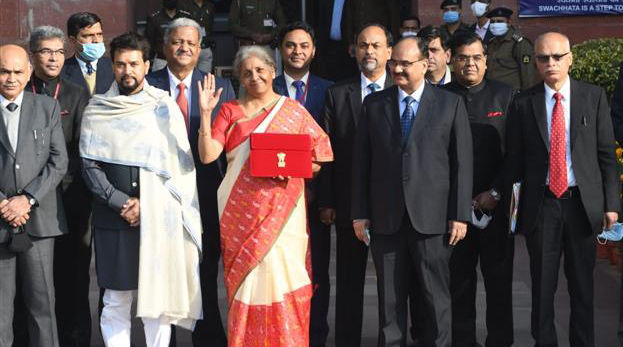The Cooperative sector has offered mixed reactions to the budgetary announcements made by the Union Finance Minister on Monday. While some cooperators have lauded the idea of setting up a separate Administrative Structure for multi-state co-ops, others would like to get included into the discussions before it takes shape.
While a few have welcomed the govt move on giving sops for converting into small finance banks, majority have not liked the budgetary announcement on the issue and alleged that it is an attempt to destroy a 100 years old co-op movement in the country.
Most of the co-operators have, however, welcomed the FM announcement of strengthening multi-state co-ops but have asked in the same breath about its actual shape.
We reproduce their reactions verbatim
Vidyadhar Anaskar, Chairman Maha UCBs’ Federation
We hail the Union Budget presented by the Union Finance Minister on Monday and the announcement to set up a separate Administrative Structure for cooperatives. But there is a need to implement it in a proper manner. Besides, to protect the interest of depositors, the minister announced plans to Amend the DICGC Act, 1961, to help depositors get easy and time-bound access to their deposits to the extent of the deposited insurance cover.
Concerning Tax Neutrality for UCBs’ transition to Small Finance Banks, there is no need to comment on it as no banks in Maharashtra are willing to fall into the government trap.
Anaskar said the relaxations RBI has given to co-ops banks during Covid-19 have been lifted now, it will impact cooperative banks’ financial position in the 2021-2022 financial year. The NPA of the banks will go upward exceeding 15 percent.
Vamnicom Director, Dr K K Tripathy
The Budget reflects a policy shift towards strengthening cooperative structures and ensuring the much-needed development of Cooperatives. However, the government, in order to ensure positive, effective and beneficial administrative structure in multi-State Cooperatives, needs to extensively hold consultations with stakeholders. Such consultations shall result in having a feasible framework. This also will help cooperatives carry out their regular activities in more than one state in the interest of members.
The proposal to provide tax neutrality for the transition of UCBs to Small Finance Banks is well thought out, timely and effective. This will ensure a smooth transition of UCBs to SFB.
However, the UCBs are to be made aware of the benefits they are going to get by being subjected to such conversions. Later, they will be strong enough to manage their own risks – be it exposure risk, credit risk, product risk or market risk etc.
SFBs are permitted to support small business ventures, marginal farmers, start-ups, micro and small industries. At the same time, they are also permitted to take up other non-risk financial activities-distribution of mutual fund units, pension and insurance products. If given an opportunity, UCBs can build up their business base in the community by getting converted into SFBs.
Repco Bank, MD, R S Isabella
It is a welcome move since after a long time, multi state societies are given due importance in the banking sector and the reforms proposed will facilitate development of such societies like UCBs.
This announcement is definitely going to encourage more UCBs that were hesitant to convert to SFB s due to the impact of capital gains. The licensing scheme / policy to enable Multi state cooperative societies to convert into SFBs need to be considered so as to bring fit and proper societies under RBI’s regulatory purview.
Chalasani Raghavendra, Chairman, VCB
As of now the details of aims and objects of the proposed Administrative Structure for Multi State Cooperative Societies are not clear. If the proposed Administrative Structure takes up issues on behalf of Multi State Cooperatives with the RBI, the Regulator and resolves them, then it will serve the intended purpose of ‘Ease of doing business’.
Another area which needs support form a Government appointed agency is to provide technology and knowledge dissemination support. It should provide technological support for upgrading the Cooperative banks’ existing hardware and software systems.
As regards Tax Neutrality for UCBs transition to Small Finance Banks, it is a carrot that is being dangled before the UCBs, with the aim of persuading them to move towards SFB. The moot question is why are the Government and RBI adopting all methods to see that the bigger Cooperative Banks are driven out of the Cooperative movement.


It is good that the Govt could finally understand the role of cooperatives in the country. Being a state subject, co-ops have been subjected to several levels of management. Hence, this new proposed structure will increase the effectiveness of multistate cooperatives by adopting common business policies across states for their operations.
This proposal on tax neutrality has given clarity and incentives to the shareholders of UCBs for transformation to SFB. Thus, an UCB planning to convert to an SFB can pass on those benefits to its shareholders. The new investors involved in the transformation process may also reap the benefits at the time of investment through valuation.
Shekhar Desai, CEO, Thane Bharat Sahakari Bank
What type of separate structure is to be seen? Here RBI and NABAD are two agencies so even if it’s given to Nabard why only for Multi state societies and not for all.
What shall be the criteria for the same need to be seen?
Amruta Pawar, Chairperson, Godavari UCB
As of now there is nothing for the cooperatives in the budget presented by the Union Finance Minister. We don’t need the government to think about the future but there is an urgent need to make policies and implement them to strengthen co-ops. Cooperatives are working for the downtrodden people but the central government is thinking about the people who are already rich. Doing everything private is not a solution. The Government is not thinking about the rural economy.






















































